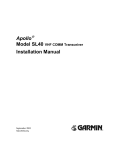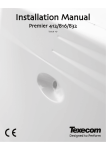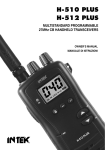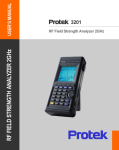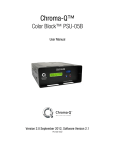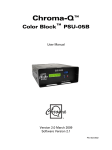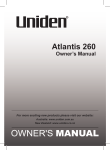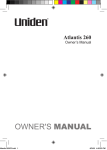Download Maxon CM70 manual
Transcript
CM70 Contents Specifications ................................................................................................................3 Control and Operation .................................................................................................4-7 Microphone ...................................................................................................................8 Installation ....................................................................................................................9 Installation of Main Unit ..................................................................................................9 Antenna Installation .......................................................................................................9 Operational test .............................................................................................................9 Frequency Bands Table ................................................................................................10 Frequency Band Selection .............................................................................................10 Table of Restrictions .....................................................................................................61 Updated Information on National Restrictions .................................................................62 Diagrams ............................................................................................................... 63-67 Declaration of Conformity .............................................................................................68 Language Pages Page Page Page Page Page Page 2-10 11-20 21-30 31-40 41-50 51-60 Page 2 of 68 English Español Français Deutsch Italiano Polski English User Manual English User Manual CM70 Specifications General Channels………………………………………..………...……………………………......…. 40 Ch AM/FM 4W Frequency Range….………………………………….………….…...…………..….26.565 to 27.99125 MHz Frequency Control……………………………………………….……………………………..…………………PLL Operating Temperature Range……………………………………………..………………….….-10q / +55qC DC Input Voltage……………………...…………………………………...………..............…13.2 V DC r15% Size…………………………………….………………………………………..….182(L) X 37(H) X 139(D) mm Weight…………………………………………………………………………………...……………………0.850 kg Receiver Receiving System…………………………………………………….….Dual Conversion Super Heterodyne Intermediate Frequency……………………………….…….……….1st IF: 10.695 MHz, 2nd IF: 455 MHZ Sensitivity………………………………………………..……………….0.5 PV for 20 db SINAD in FM mode Audio Distortion………………………………………………………………………….Less than 8% @ 1 KHz Image Rejection………………………………………………………………………………………………...65dB Adjacent Channel Rejection………………………………………………………………………………….65dB Signal/ Noise Ratio……………………………………………………………………………………………..45dB Current Drain at standby……………………………………..……………….……………………….....250 mA Current Drain at maximum audio…………………………….…………………………………………650 mA Transmitter Output Power…………………………………………………………………………..……...….4W @ 13.2 V DC Modulation…………………………………………………..……………………...………FM: 1.8 KHz r0.2 KHz Output impedance……………………………………………………...…………………RF 50 ohm Unbalance Signal/ Noise Ratio……………………………………………………………….……………………..40 dB MIN Current Drain……………………………………………………………………………….……………….1200 mA Page 3 of 68 Specification Frequency response……………………..……………..…….………………..……...From 400 Hz to 2.5 KHz English User Manual CM70 Control and Operation Front Panel 1. Power On/Off This Button switches the radio ON and OFF. 2. LCD Display This large, red backlit system allows clear readability. The LCD display shows all enabled functions as well as several other features (programmable by the user), such as the channel readout or the full 5-digit frequency readout. It also includes a digital 10-bar S/RF Meter to monitor the strength/power of received and transmitted signals. B. ESP C E Icon The ESP icon is visible when the ESP (Electronic Speech Processor) function is enabled. Page 4 of 68 Control and Operation A. VOL Icon The VOL icon is visible when adjustments are made to the volume control. English User Manual CM70 C. LOCK Icon The LOCK icon is visible when the LOCK function has been enabled. D. AM Icon The AM icon is visible when the radio receives and transmits in AM mode (amplitude modulation). E. FM Icon The FM icon is visible when radio receives and transmits in FM mode (frequency modulation). F. DW Icon The DW icon is visible when the DUAL WATCH function (automatic monitoring of two channels) is enabled. The DW (Dual Watch) function allows automatic alternate monitoring of two programmable channels. Select the first channel to be monitored using thejand i or the channel selection keys on the microphone. To enable the DW function, press/hold the EMG key until the DW icon appears and blinks on the LCD display. Now select the second channel to monitor using the j and i or the channel selection keys on the microphone. Press/hold the EMG key. The DW function is now enabled and the LCD display will alternately show the channel number of the two programmed channels. The DW icon will be visible on the LCD display. Monitoring stops if a signal is detected on one of the two channels, in order to let the user listen to the incoming signal and will start again when no signal is detected on that channel. It is possible to transmit on that channel by simply pressing the PTT key. If there is no transmission within 5 seconds, monitoring will restart. To exit the DW mode, short press the PTT button. G. H. I. Alphanumeric Digit G. These two alphanumeric digits indicate the country code, in accordance with the programmed frequency band (i.e. DE, UK, CE, etc.). H. I. These three alphanumeric digits indicate the operating channel number (01 to 80, according to the programmed frequency band), when the channel number readout function is enabled J. ASQ Icon The ASQ icon is visible when Auto Squelch enabled. K. LO Icon The LO icon is visible when the transmitter is in LOW POWER (1W) mode. L. TX Icon The TX icon is visible when radio is in transmit mode. M. RX Icon The RX icon is visible when radio is in receive mode. O. VOLUME / SQUELCH Digital Level Icon A digital 10-bar indicator displays the level of the volume and squelch. P. S/RF Digital meter A digital 10-bar S/RF METER indicates the strength of the received signal (from S0 to S9+30) in receive mode and transmitter RF output power (0 to 4W) in transmit mode. Q. EMG Icon The EMG icon is visible when one of the pre-programmed emergency channels has been selected. R. SCAN Icon The SCAN icon is visible when the SCAN function (automatic search of busy channels) is enabled. 3. EMG (Emergency Channels) Key This key allows quick access to one of the two pre-programmed emergency channels (CH9 or CH19). Each time this key is pressed, radio will select CH9, then CH19, then again the normal operating channel. When Page 5 of 68 Control and Operation N. SQ Icon The SQ icon is visible when adjusting the squelch control. English User Manual CM70 one of the emergency channels is selected, the EMG icon will appear on the LCD display. The operating mode (AM or FM) for the emergency channels are factory pre-programmed as per the following table. COUNTRY CODE I0 I2 DE D2 EU CE SP FR UK PL CH-9 AM AM AM AM AM FM AM AM FM AM CH-19 AM AM AM AM AM FM AM AM FM AM 4. AM/FM Key This key allows the user to select the AM or FM operating mode in both RX and TX. The AM/FM operating mode selection is possible only if it is allowed in the programmed frequency band. 5. SCAN Key By pressing the SCAN key, the SCAN (automatic scanning of busy channels) function is enabled. To enable the SCAN function, first adjust the SQUELCH level, until the background noise is cut out. Then press the SCAN key, radio will automatically start scanning all channels continuously and the SCAN icon will appear on the LCD. Auto-scan stops if a signal is detected on a channel, (in order for the user to hear the incoming signal) and will start again when no signal is detected on that channel. If the PTT Key is pressed within 5 seconds, the radio will remain on that channel, otherwise scanning will start again. Auto-scan may be also re-started at any time by pressing the SCAN key. To exit SCAN mode, short press the PTT button. 6. MICROPHONE Connector Connect the supplied dynamic microphone via this connector, locking it via the ring nut. 7. MODE Key Use the MODE key to enable and program the various function of the radio. Pressing the MODE key will scroll through the various functions. The sequence of the various functions may vary depending on current functions. - ASQ Auto squelch control or appears on To enable Auto Squelch control, press the MODE key repeatedly, until the icon the LCD. Use the jor i to set the desired level and short press the PTT key to confirm and store your selection. - SQUELCH LEVEL When you want to adjust the Squelch level, press the MODE key repeatedly, until the icon the LCD. Use the and appears on to increase or decrease the Squelch level. - BEEP TONE When a key is pressed, a beep tone is heard to confirm your command. You may enable or disable this beep - LCD DISPLAY BACKLIGHT SETING Press the MODE key repeatedly, until the icon or appears on the LCD. Use the j or i to set the desired level and short press the PTT key to confirm and store your selection. MEMORY CHANNELS (M0-M9) PROGRAMMING Use the j or i key to select the channel to be stored as a memory channel. Pressing the MODE key several (M0-M9) appears on the LCD display. Using the jor i to select a channel times, until the icon number to be stored in the memory, press/hold the MODE key, until the previously selected channel number appears on the LCD. All data of that channel will be stored (Channel number, frequency readout, AM/FM mode, transmitter power, etc.). MEMORY CHANNELS RECALL Press/hold the MODE key, the memory channel number (M0-M9) will appear on the LCD. Using the j or i to select the desired memory channel. Press the MODE key again to exit memory channels recall mode. Page 6 of 68 Control and Operation or appears on the LCD. Use the jor tone, by pressing the MODE key repeatedly, until the icon i to set the desired level and short press the PTT key to confirm and store your selection. English User Manual CM70 8. UP – Down SLIDE BAR Use the and to increase or decrease Volume and Squelch level. 9. ESP (Electronic Speech Processor) Key The ESP (Electronic Speech Processor) is an exclusive advanced feature of the Maxon CM70 CB radio. ESP (Electronic Speech Processor), works as a modulation compressor during transmission and as a modulation expander during receive mode. The ESP obtains stronger, cleaner and clearer audio signals, great help in noisy areas especially in the case of long distance communication or weak signals. The efficiency of ESP is even greater when communicating with other radios using the same system. To enable or disable the ESP function, press the ESP key. When enabled, the ESP icon appears on the LCD display. ESP performance of the modulation in RX and TX modes 10. j (Quick Down) Key This key allows fast selection of the operating channel downward. Each time this key is pressed, the channel number moves down by 1 channel. Press this key for about 2 seconds, the channel number moves down by 10 channels. 11. i (Quick UP) Key This key allows fast selection of the operating channel in increments. Each time this key is pressed, the channel number moves up by 1 channel. Press/hold this key to move the channel number in groups of 10. Rear Panel 13. S-METER Jack This jack is for connecting an external S-METER (optional). 14. ANTENNA Connector Antenna connector. Refer to the section INSTALLATION OF THE ANTENNA. 15. 13.8DC POWER CORD 13.8 DC power cord input. Page 7 of 68 Control and Operation 12. EXT (External Speaker) Jack This jack is for connecting an external speaker (optional). English User Manual CM70 MICROPHONE 16 17 18 19 20 16. PTT (Push-to-Talk) Key Transmitter key. Press the PTT key to transmit and release it to return to the receive mode. 17. UP (Channel Selector) Key Each time this key is pressed, the channel number will move upward by one channel. * Can be used instead of i You can use this key to set ASQ, SQ, BEEP TONE, BACKLIGHT and MEMORY. This key is the same as the MODE Key on the front of the radio. * You can also use this key for increasing or decreasing volume level. or appears on the LCD. The UP Pressing the LOCK/MODE key several times, until the icon KEY or DN Key on microphone can also be used to increase or decrease the volume level. 19. DOWN (Channel Selector) Key Each time this key is pressed, the channel number will move downward by one channel. * Can be used instead of j 20. MICROPHONE Plug The 6-pin microphone plug with locking ring nut is connected to the microphone connector located on the front of the radio. Page 8 of 68 Control and Operation 18. LOCK/MODE Key The LOCK function is enabled by a press/hold of this key locks the keypad and prevents the activation of unwanted features. When the LOCK function is enabled, the LOCK icon appears on the LCD display. English User Manual CM70 Installation Before installing the main unit in a vehicle, check and select the most convenient location, so the radio will be easy to reach and comfortable to operate, without disturbing or interfering with operating the vehicle. Use the supplied bracket and hardware to install the radio. The bracket screws must be well tightened in order not to become loose with vehicle vibrations. The car mounting bracket can be installed above or below the radio and the radio may be tilted as desired according to the specific type of installation (under dashboard or track cabin roof installation). Installation of Main Unit Before connecting the radio to the vehicles electrical system, ensure that radio is switched off. The DC power cable is complete with a fuse holder (fuse located on the red positive (+) wire). Connect the DC power cable to the vehicles electrical system, pay special attention to correct polarity, even if the radio is protected against polarity inversion. Connect the red wire to the positive (+) pole and the black wire to the negative (-) pole of the vehicles electrical system. Ensure that wires and terminals are firmly connected, in order to prevent cables from disconnecting or causing short circuits. Installation of the Antenna A specific mobile antenna adjusted for 27 MHz frequency range must be used. The antenna installation must be carried out by a specialist technician or service centre. Please take special care to fully install the antenna on the vehicle with a perfect connection to ground. Before connecting the antenna to the radio, it is necessary to check the correct operation of the antenna with low standing wave ratio (S.W.R.), using adequate instruments. If not, the transmitter circuit of the radio could be damaged. The antenna is usually installed on the highest part of the vehicle, free from obstacles and as far away as possible from any source of electric or electromagnetic noise. The RF antenna coaxial cable must not be damaged or pressed on its way between antenna and the radio. The correct operation of the antenna and the low standing wave ratio (S.W.R.) must be checked periodically. Connect the RF antenna coaxial cable to the antenna Connector, located on the rear side of the radio. Operational Test Once the radio has been connected to the vehicles power supply and the antenna is installed, the operation of the system can be check and tested. Please proceed as follows: 1.) 2.) 3.) 4.) 5.) 6.) 7.) 8.) Make sue the unit is installed correctly. Check that the power cable is fitted correctly. Check that RF antenna coaxial connector is correctly fitted. Fit the microphone to the front panel connector. Power on the unit and select correct Frequency band for country of use. (see page 10) Adjust the squelch to be open (noise from speaker) via mode key, select SQ and use j or i. Select desired channel using j or i. Press PTT (Push To Talk) to transmit and release to receive. If the test is successful the unit is ready to use. If you incur any problems please contact your dealer. Installation Page 9 of 68 English User Manual CM70 Frequency Bands Table The CM70 transceiver includes an advanced multi-standard programmable circuit, which allows the user to program different frequency bands, specifications and operating modes (in conformity with the regulations in the country where the product is being used). 10 programmable frequency bands are available, as per the below table: COUNTRY CODE COUNTRY I0 ITALY I2 ITALY DE GERMANY D2 GERMANY 40CH FM 4W - 12CH AM 1W EU EUROPE 40CH FM 4W - 40CH AM 1W CE CEPT SP SPAIN FR FRANCE UK UK PL POLAND SPECIFICATIONS (CH, operating modes, TX power) 40CH AM / FM 4W 36CH AM / FM 4W 80CH FM 4W - 12CH AM 1W 40CH FM 4W 40CH AM / FM 4W 40CH FM 4W - 40CH AM 1W 40CH FM 4W UK FREQUENCIES -40CH FM 4W CEPT FREQUENCIES 40CH AM / FM 4W POLISH FREQUENCIES Attention! This radio has been factory pre-programmed on the CE frequency band (CEPT 40CH FM 4W), since this standard is currently accepted in all the European countries. Please refer to the information table (Restrictions on the use of CB transceivers). Frequency Band Selection /Programming The radio must be programmed and used exclusively on a frequency band allowed in the country where the product is used. It is possible to program a different frequency band, as per the following procedures: 1) Switch off the radio. 2) Press and hold the EMG key while turning on the radio, using the Power knob – Release while all displayed icons are still lit. 3) The current country code will blink on the LCD display (2 digits). 4) Now select the desired new country code, using the jor i. 5) Shortly press the EMG key to confirm. Frequency band Table Page 10 of 68











